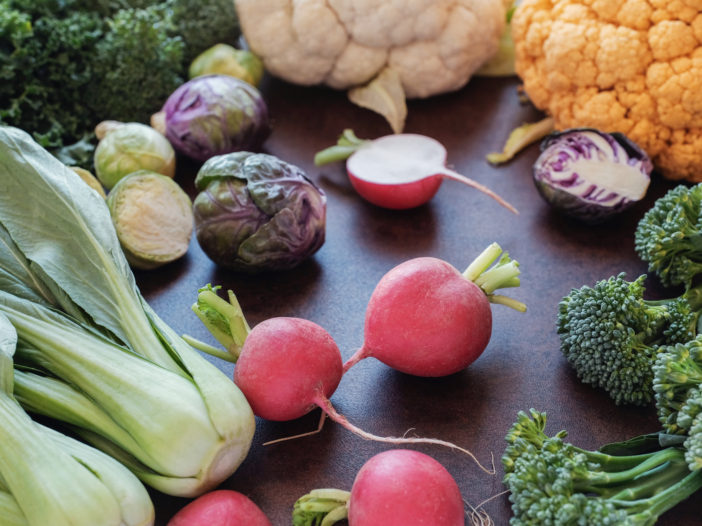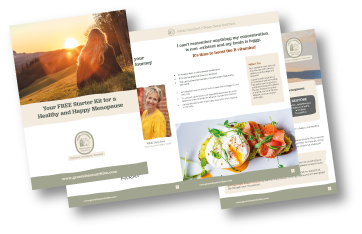
We all know that vegetables are good for us. But when it comes to menopausal symptoms, they really come into their own.
And that is because of the way they function in the body.
In a way, many of the molecules found in vegetables can really act like a natural pharmacy when it comes to reducing symptoms.
And research has shown very clearly that women who eat lots of fruit and vegetables tend to experience fewer physical and mental health symptoms of the menopause than those who prefer a diet full of sweets, fatty foods and snacks.
But what are the best vegetables which can help with menopausal symptoms naturally?
Without a doubt, there is one family of vegetables which rises way above anything else when it comes to the benefits of using food to balance your hormones and reduce unwanted symptoms.
And it is the cruciferous or brassica family of vegetables!
They include:
Broccoli
Sprouts
Cauliflower
Cabbage
Leafy greens (collard greens, mustard greens, Kale, bok choy, swiss chard and watercress)
Some root vegetables (turnips and radishes)
So now you know what they are, read how they can help to support you in your peri and menopause:
Cruciferous vegetables contain the compounds DIM and indole-3 carbinol which support the liver in the metabolism and clearance of oestrogen from the body
This is particularly important as oestrogen which is not cleared properly and allowed to circulate around the body can become toxic and disrupt the balance of your sex hormones. Common symptoms associated with this include PMS, brain fog, insomnia, fatigue, weight gain, depression, headaches and a sluggish metabolism. Pretty much all the stuff you don’t want to be dealing with at this time in your life.
These compounds also have a role in protecting the body against hormone dependent cancers and tumour growth. They are also high in antioxidants and this helps to reduce inflammation and in turn ease the symptoms.
Leafy greens are full of nitrates which help to protect the heart
Why is this important for peri and menopausal women?
One of the roles of oestrogen is to produce nitric oxide. And nitric oxide widens blood vessels so that blood pressure is maintained at healthy levels and the risk of strokes and heart disease is reduced. But this protection reduces when women transition through the menopause and oestrogen levels decline.
Therefore, by eating leafy greens which are high in nitrates, your diet will support this vasodilatory function and have a role in boosting your heart health.
Leafy greens reduce the risk of osteoporosis
One of the risks associated with the menopause is osteoporosis. This is once again linked to the drop of oestrogen. And with this decline in oestrogen, your bone density decreases.
One way to combat this is to eat a diet rich in calcium. And contrary to popular belief, calcium is not only found in dairy foods. Leafy greens are a great source of calcium and a perfect substitute for those who try to avoid dairy in their diet. And what’s more, the calcium in most green leafy vegetables is more absorbable than calcium in milk.
Leafy greens are also packed with magnesium which helps with the absorption of calcium.
But that’s not all! Magnesium is often referred to as the natural tranquiliser. It helps improve your sleep, reduces anxiety and irritability and helps with low mood. And again these are all common symptoms of the menopause.
Cruciferous vegetables can help with ageing skin
Cruciferous veg are great for your skin health. They contain vitamin C which is required for the production of collagen and this helps keep pour skin plump and elastic and this can start to decline when your oestrogen levels drop away. In addition, they contain sulforaphane which protects your body against free radical damage which is linked to ageing.
Cruciferous vegetables are a good source of fibre which helps to reduce menopausal symptoms.
Fibre supports your body as you transition through the menopause in many ways:
Weight gain is a common symptom of the menopause. And fibre helps with satiety, making you feel fuller for longer. And so the desire to snack is reduced.
It also helps with the regulation of your hormones. Fibre supports healthy bowel movements and so helps to get rid of excess oestrogen from the body. In doing so, it helps to keep your hormones balances and symptoms minimised.
So there, you have it. The power of cruciferous vegetables in black and white for you to see. Ideally you need to include vegetables in your diet every day and aim to fill half your plate with these wonderful foods.
So just enjoy and start to experiment. There are so many ways to incorporate vegetables into your diet and make them the star of the show. And soon you’ll find that you can’t live without them!
And remember that the right diet and lifestyle can make a huge difference to your health and well-being during the menopause. It really is the right time to focus on getting the basics right and get a broad range of nutrients to support your body during this time of hormonal change. You can’t avoid the menopause, but by changing your diet, you can certainly change the impact it has on your life.
If you would like to learn more about how to eat during your peri and menopausal years, download my starter kit here

